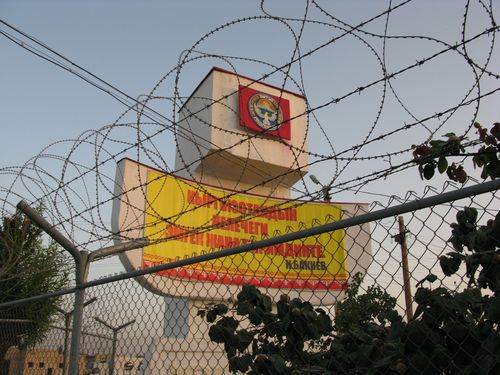Uzbekistan, Kyrgyzstan avoid large-scale conflict

By Aynur Jafarova
Uzbekistan and Kyrgyzstan have successfully resolved their recent conflict on the border, which was a potential threat to security in the region.
According to local media, Kyrgyzstan has apologized for frontier guards who violated the Kyrgyz-Uzbek border while Uzbekistan promised to pay compensation for damages.
Obviously, neither Uzbekistan nor Kyrgyzstan wanted the conflict -- especially an ethnic one -- in the Central Asia region.
The borderline incident took place earlier this January after several hundred residents of the Uzbek enclave of Sokh reportedly attacked a border guard base where they took Kyrgyz citizens hostage.
The incident is said to have started when a group of residents from the Uzbek village of Khushyar attacked Kyrgyz frontier guards, who were erecting supports for electricity transmission lines in the Batken region.
Uzbekistan's border protection agency earlier said the conflict on the Uzbek-Kyrgyz border was provoked by Kyrgyz frontier guards who independently and without previous notification started work on the installation of electricity poles at the Charbak frontier post of Kyrgyzstan in violation of international law and inter-governmental agreements.
The Kyrgyz side admitted that installation work was also conducted in the Uzbek territory.
Charbak is a delimitation zone between Uzbekistan and Kyrgyzstan. Although the issue regarding this area was coordinated by intergovernmental agreements in the early 1990s, the border has not yet been fully demarcated.
50 kilometer long problematic sections remain around the Sokh enclave on the border. The total length of the Uzbek-Kyrgyz border is 1,378 km, with more than 1,000 km demarcated.
There are eight enclaves in Central Asia. Sokh district is one of these enclaves and also a disputed territory between Kyrgyzstan and Uzbekistan where existing state borders don't match with ethnic structure and this causes many interethnic problems.
In general, the Fergana Valley, a region where Kyrgyzstan,
Tajikistan and Uzbekistan meet, has a large number of enclaves.
These enclaves appeared as a result of disintegration within the
USSR and coincided with territorial disputes and disorders. They
were carved out based on the main language spoken by the majority
of the population living there.
Sokh with predominantly Tajik population has 26 schools and four
colleges in its 20 villages, which operate in Tajik. So does the
local media.
Some Kyrgyz MPs believe that the recent incident in Sokh enclave resulted from negligence of the Kyrgyz authorities and shows the problems in borderline areas.
In 2011 the parliament adopted a number of laws and a state program on strengthening the borders of the Kyrgyz Republic with neighboring countries, as well as the law on assigning special status to borderline territories. However, no measures on implementation of these regulations and the program have been taken to date.
There were clashes between Kyrgyzes and Uzbeks in southern Kyrgyzstan, primarily in the cities of Osh and Jalal-Abad, in 2010.
Uzbekistan launched a limited troop incursion early on, but withdrew and opened its borders to Uzbek refugees. The clashes killed up to 2,000 people, mostly Uzbeks, and another 100,000 were displaced.
Experts believe the recent incident on the Uzbek-Kyrgyz border will not turn into large-scale stand-off between the two countries.
The release of all Kyrgyz hostages and payment of compensation by Uzbekistan to Kyrgyz citizens back up this conclusion.
The Kyrgyz government is aware that Sokh is located very close to Uzbekistan and it is in the interest of Bishkek to keep order among its people in the Sokh area and guarantee there is no reason for Uzbekistan to consider sending troops across the border, because the military and weaponry of Kyrgyzstan is much smaller than Uzbekistan.
The energy issue is also a factor in the future of Kyrgyzstan-Uzbekistan relations: Uzbekistan supplies natural gas to southern Kyrgyzstan. The Uzbek government uses this issue as a means of pressure over Kyrgyzstan by cutting off gas supplies to southern Kyrgyzstan often because of political disagreements between the two governments.
According to experts, such a move could be made again soon if the Uzbek government feels it is necessary to put pressure on the Kyrgyz government over the Sokh incident.
Meanwhile, Sokh residents have faced customs problems when traveling through Kyrgyzstan to the rest of Uzbekistan and through Sokh to the eastern or western parts of Kyrgyzstan.
Such difficulties have impeded economic development of the region, and Sokh and the surrounding Bakten region are underdeveloped. Unemployment in the area is high and the economy is based on agriculture. Young people in the region tend to leave for Russia in search of jobs.
Here we are to serve you with news right now. It does not cost much, but worth your attention.
Choose to support open, independent, quality journalism and subscribe on a monthly basis.
By subscribing to our online newspaper, you can have full digital access to all news, analysis, and much more.
You can also follow AzerNEWS on Twitter @AzerNewsAz or Facebook @AzerNewsNewspaper
Thank you!
